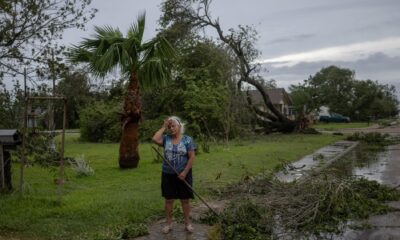As the fallout from the AstraZeneca vaccine controversy continues, some countries are looking at mixing and matching vaccines as a way to fully protect people from COVID-19.
Canada may be one of them. Dr. Howard Njoo, Canada’s deputy chief public health officer, said Thursday that “it’s possible” Canada could see vaccine dose mixing in its future.
“It’s possible, but at the present time, I would say that Health Canada is looking at the data that they’ll certainly take that into account in terms of what is best in the Canadian context,” he said at a virtual news conference.
“NACI (National Advisory Committee on Immunization) will also look at the data as it continues to evolve and become available from other countries around the world and they’ll make the best recommendations for the second dose for the AstraZeneca two-dose regime.”
Read more:
Why rare blood clots could be a side effect of AstraZeneca COVID-19 vaccine
His comments stem from growing concern around the possible link between the AstraZeneca vaccine and a rare blood clotting disorder, which has resulted in NACI and Health Canada recommending the shot only be given to those over the age of 55.
However, some younger Canadians ended up receiving the shot before that guidance was announced and implemented.
Njoo skirted a direct response on what recommendations there are for younger Canadians who have already received the shot. He suggested more guidance may be coming.
“For the younger ones, I think we’ll let it play out in terms of the due diligence,” he said. “Health Canada as a regulator has been in very close contact and communicating with their European counterparts… They’ll do their deliberations and come forward with recommendations as appropriate.”


The fact Canada has extended its dosing intervals to four months buys time, Njoo said.
“I think, for the time being, folks are fine,” he said.
“Other options could be looked at,” he continued. “We’re seeing some experience and trials going on around the world in terms of a schedule where someone might receive a first dose of a certain vaccine and their second dose of another. We’re looking very carefully at that as well to see what the outcomes are in terms of overall effectiveness.”
The EU’s drug regulator decided Wednesday that blood clots should be listed as a very rare side effect of the AstraZeneca vaccine for COVID-19. However, after reviewing a study analyzing 86 European cases, the European Medicines Agency (EMA) concluded the benefits of the vaccine still outweighed the risk.
The EMA could not list specific risk factors such as age or gender, but said most blood clot cases involved women under 60.
Read more:
AstraZeneca vaccine trial in kids paused as adult blood clot link investigated
In response, at least one country has decided to green-light the mixing and matching of different doses.
Germany’s vaccine advisory committee said Wednesday that it sees no disadvantages or risks from giving younger recipients of AstraZeneca’s shot a second dose of an alternative vaccine.
The commission, known as STIKO, recommended people under age 60 who received a single shot of AstraZeneca receive an mRNA vaccine — such as Pfizer-BioNTech or Moderna — as their second dose.
It said the second dose should be administered 12 weeks after the AstraZeneca shot.
“Nobody expects from an immunological perspective that there will be a disadvantage to getting a second dose of another vaccine,” Marianne Roebl-Mathieu, a member of Germany’s standing committee on vaccinations, said in an online briefing.
Should a second dose prove ineffective, a third dose could be effective, added Roebl-Mathieu. Her colleague on the panel, Christian Bogdan, said he had seen no evidence linking other vaccines to the rare blood clotting disorders.


Studies involving mixing vaccine doses are underway.
A trial led by Oxford University in the United Kingdom is testing the safety and efficacy of mixing different shots. If the results are positive, experts say the practice could help ease supply chain issues and help create a more robust immune response in recipients.
Canada so far has four vaccines in its arsenal. Two are mRNA vaccines and two are more conventional vaccines, grown from weakened forms of the virus.
NACI has recommended that provinces and territories wait up to four months to administer the second dose to people in order to optimize vaccine rollout and offer more people protection from an effective vaccine sooner.
However, the committee doesn’t recommend mixing and matching at this time.
Read more:
U.K. study underway to test COVID-19 vaccine mixing. Should Canada follow suit?
Its guidance states that a person’s vaccine series “be completed with the same COVID-19 vaccine product,” meaning both doses should be from the same manufacturer.
“Currently, no data exist on the interchangeability of COVID-19 vaccines,” the committee’s website reads.
However, NACI said, “if the vaccine product used for a previously received dose is not known, or not available, attempts should be made to complete the vaccine series with a similar type of COVID-19 vaccine (e.g., mRNA vaccine and mRNA vaccine).”
The committee said it “is not recommended that vaccines of different types (e.g., mRNA vaccine and viral vector vaccine) be used in the same series.”


“Active surveillance of effectiveness and safety of a mixed schedule will be important.”
The committee said its recommendations regarding the mixing of doses may change as more evidence becomes available.
Health Canada told Global News on March 31 that an application to hold a trial to test the efficacy and safety of COVID-19 vaccine mixing has not yet been submitted.
— with files from the Canadian Press and Global News’ Hannah Jackson
Must See
-




Entertainment
/ 3 days agoFaveSzn’s Revelation: Dating Choirmaster at 10 and Sexual Curiosity
Nigerian singer, Chidozie Ugochinyere, popularly known as FaveSzn, has revealed that she once dated...
By Flying Eze -






Europe
/ 3 days agoWhy Hungarian Prime Minister Orban visited
Two months later, the leaders of China and Hungary met again. Hungarian Prime Minister...
By Flying Eze -






News
/ 3 days agoThree dead and millions without power as Tropical Storm Beryl hits Texas
Man, 53, and woman, 74, killed by fallen trees and third person drowns amid...
By Flying Eze



